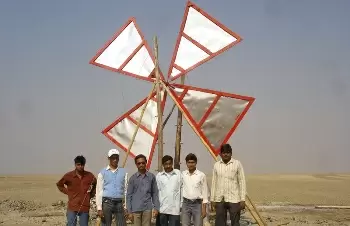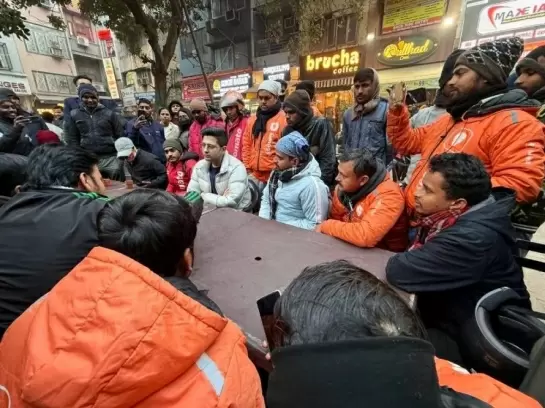A grass root innovation of windmill to operate tube well has caught on

24-March-2012
Vol 3 | Issue 12
A grassroots innovation of a windmill operated tube well has come as a boon to the salt farmers of Little Rann of Kutch in coastal Gujarat, who were earlier dependent on diesel pump sets to pump out seawater for making salt.
Several farmers have switched to the windmill now and have reduced their operational expenses by about 40 percent.
 |
|
Mohammad Mehtar Hussain and Mushtaq Ahmad (seen with their friends) developed the windmill to pump water
|
The men behind the windmill are two brothers, Mohammad Mehtar Hussain and Mushtaq Ahmad from Darrang district in Assam, who have just passed higher secondary school. They started working on the project inspired by the sight of a soaring kite and a sewing machine and hit upon the idea of using wind energy to operate a hand pump.
Back in their village, the brothers cultivated paddy, which required plenty of water. The villagers used electric and diesel pump sets to pump groundwater to irrigate their fields.
However, frequent power cuts, and the rising cost of diesel set them thinking on finding a low cost alternative to electric and diesel pump sets to sustain their agriculture. Hand pumps involved too much physical strain, and so it was ruled out.
In 2003, the brothers came up with a cheaper and effective alternative. It was a low cost windmill, which was made with locally available bamboo, tin sheet, strips of old tyres and an iron shaft. The windmill was connected to a hand-pump.
“Initially, we made the windmill fans using bamboo frames with plastic sheets on them. The plastic sheets got torn after a while. Later, we put aluminum blades on the bamboo frames, which were sturdier,” recalls Mushtaq.
The result was good and the villagers too were very happy with their innovation.
Seeing their work, Karunakant Nath - who himself was an innovator recognized by the National Innovation Foundation - encouraged the brothers to approach the GIAN (Grassroots Innovation Augmentation Network) office in Guwahati.
GIAN provided Rs.25000 and asked them to build four more windmills in their village.
Later, GIAN realized the potential of the windmills in the salt farms in Gujarat. “We did major modifications to make it suitable for salt farming,” says Mahesh Patel, chief innovation manager, GIAN.
Alstom Foundation of France sponsored the installation of the windmills in Gujarat, where around 50000 salt farmers are estimated to be using diesel pumps to pump out seawater for making salt.
For the poor salt farmers, the windmills have come as a boon. In coastal region of Gujarat, wind is abundant and so the conditions are perfect for the windmills. No wonder the response has been good here. Thirty four windmills have already been installed in Amreli district.
In the next fortnight or so, another 16 would be installed. “It is an ongoing process and we would be installing more windmills in future,” says Mahesh.
.webp) |
|
A windmill located at a salt farm
|
This green technology that requires low installation cost and zero operating cost not only helps in light irrigation but also could be used to pump out potable water for domestic needs.
According to GIAN the working principle of the windmill is similar to conventional ones, but the use of low cost, locally available material instead of costlier metals for the framework and the direct drive to do automatic pumping of water from the tube well has given it an innovative shape. It is also a portable unit that could be dismantled when not in use.
While the basic model would cost around Rs 4500, an improvised model for commercial use costs around Rs 40000.
The windmills used in Gujarat are highly modified and use a tower structure instead of bamboos. The turbine blades are made of light weight material.
It is estimated that the salt farmers spend Rs 1 lakh to produce 1000 tons of salt, of which Rs 60000 is spent on diesel alone.
For every rupee they save - which would run into hundreds of crores of rupees in just a few years time - the Gujarat farmers need to thank Mohammad Mehtar Hussain and Mushtaq Ahmad for their excellent innovation.














